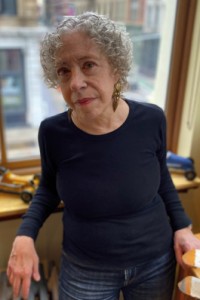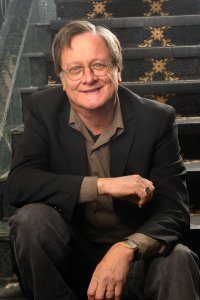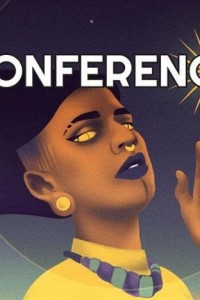Spotlight on: T.L. Huchu
The Library of the Dead is the first book in a new series from Tor. Tell us a bit about it — the world where it takes place, and the characters who inhabit that world
My new book, The Library of the Dead, is the first in a brand-new series called Edinburgh Nights. It tells the story of Ropa Moyo, a young girl who delivers messages from ghosts to the living for money. Despite her age, Ropa is an extremely smart, resourceful, tough little cookie. When one of her spectral clients asks her to find a missing child, Ropa is drawn into the darker side of magic in Scotland. Along the way, she makes new friends, discovers an occult library, gains a magical mentor, and battles villainous villains like the Midnight Milkman. The novel is set in what most people have described as a dystopian Edinburgh, but I wanted to remake Edinburgh as a third world city, so go figure. You know that thing immigrants do, come to your country, steal your jobs, ruin everything — that’s pretty much what I did to Edinburgh in this novel. There’s lots of cool stuff in there too, involving Scottish history, Zimbabwean magic, science, and philosophy, with some proper geek shit thrown in the mix for good measure.
Do you have plans for further books in the series? If so, is this a story with a set ending, or more of an open universe where many stories could take place?
I have a lot to say about the world of Ropa Moyo! There are two novels currently planned in the story arc, but I have many more ideas brewing and would love to keep going with her escapades in Edinburgh. I have great admiration for writers who create ever-expanding universes, but my personal preference leans towards series in which I know there’s an end in sight. Perhaps this is why I don’t watch soap operas!
Before you began publishing genre fiction, you were known for your literary novels, starting with The Hairdresser of Harare in 2010. Why the shift to speculative fiction? Does the genre provide opportunities that literary fiction doesn’t (or vice-versa)?
I don’t quite see my writing speculative fiction as a shift since I view genre as one of many tools in the writer’s kit. We could go on about how literary fiction is itself a genre, but I will try to avoid regurgitating worn clichés here. I’ve done a bit of short fiction, working primarily in SFF, crime and lit fic, and the reason I do this is because when an idea comes to me, I try to figure out the appropriate form for it before the writing begins. The Hairdresser of Harare, which you mention, borrows a lot from chick lit, and my other book, The Maestro, The Magistrate & The Mathematician, riffs off and subverts the spy novel. In this sense I’ve always been working in genre even when it isn’t packaged as such. In my reading I gravitate towards so-called “genre bending” works and novelists who are unafraid to mix it up like cutting-edge DJs. There is an element of playfulness in what I do, I’m always trying to have fun when I’m crafting my works, so each genre has narratological conventions which I can appropriate and repurpose in the service of the story I wish to tell. The speculative aspects of The Library of the Dead allow me to have a mash-up of psychogeography, alternate-history, science, magic, and other elements which might otherwise not gel together in a different genre. I wanted to embed the sort of wacky shit that gives me a hard-on in a rollicking romp; in effect to craft the sort of novel I want to read.
You’re from Zimbabwe, but have spent much of your adult life in Scotland. How does your deep experience with those very different cultures and landscapes inform your writing?
Scotland was a key partner in the British imperial project, and coming from a former settler colony like Zimbabwe there’s very little in Scottish culture that I do not recognise. I know it’s fashionable to present culture shocks and state these things as profound issues surrounding identity and all that bollocks, but I’m very comfortable straddling the two nations. Any notion of cultural purity on one side or the other is utter nonsense—that boat sailed from the Clyde 150 years ago and she ain’t coming back. But there are still enough significant differences, which enable me to create stuff that I hope is unique compared to what has been there before, and this is where things get interesting for me as a writer. For example, I learnt the English language in school and while I am fairly proficient my usage tends to be stilted or formal, because that’s what they teach you, right? So in order to have something a little more dynamic, I’ve begun to draw from Scots, infuse that with a bit of Shona, slangify shit and, hopefully, that results in tension, something sonically pulling in different directions. While most writers actively avoid clichés and are trying to “coin fresh metaphors,” I’m actively seeking out and using colloquialisms and the sort of stock catchphrases, which have been discarded because I believe they contain the organic linguistic genius of the culture that spawned them. That the very fact those phrases have passed into cliché is evidence of this. In short, I’m pro-cultural appropriation, and I intend to steal from the Scots until I die. Cancel that, motherfuckers.
Tell us a little about your journey from being an aspiring writer to a published one.
You’re asking me to describe the journey towards a mirage here. So, there I was in my early 20s, mind blown by Dostoevsky and the Russians. I was reading stuff that connected to me deeply, meaningfully, truthfully, and because of the arrogance of youth I thought I could do it too. I mean, how hard can it be, right? My first attempt at writing a novel was a godawful plagiarism of Dostoevsky’s Demons transcribed into 21st Zimbabwe, which I thought was a work of monumental genius at the time until I submitted it and got turned down by everyone in town. I’d like to take a minute here and thank every literary agent and publisher who rejected that turd; you saved me a lifetime of embarrassment. But, hey, from that hubris came some humility and the knowledge I had to learn the craft and this is a lesson I still carry with me today. I kept plugging away, reading loads and writing on the side until I got there eventually. It was a long, hard road, and in many ways it still is because publication isn’t the destination, it’s merely a step in the right direction. The white blank page still terrifies the living fuck out of me. I’m still learning, trying to be a better craftsman. I think that will only stop when they put me in a box and plant me. (*somebody get me a box of Kleenex, please.)
Who are some of your literary influences?
Oh God, how long have we got here? I think when you read a lot and try to learn and absorb what you can from each text you encounter shit starts to get blurry after a while. I’m even embarrassed to say there are writers I dissed in my youth whose techniques I now draw upon today. Does that make me a hypocrite? I remember when it was fashionable amongst the literati to diss Dan Brown ‘cause he was poppin’ and I was regurgitating that shit, but guess what, here I am fifteen years later riffing off him for the second installment in my series because I now recognise there are structural elements in his oeuvre that I can repurpose for my project. So, I’ll admit it, I was a dick and said things I shouldn’t have. The reality is I draw upon whoever I can if it suits that particular project. For The Library of the Dead I pinched stuff off Ben Aaronovitch, salvaged components from Susanna Clarke, that kind of thing. In other projects I’ve lifted from Hove, Ladipo-Manyika, Woolf, Bolano, Brautigan, Auster, etc., etc. I don’t care; I have a huge body count and I’m not ashamed of it. Sorry, Fyodor, you know I still love you, you’re my number one.
Is there anything else you’d like our readers to know? Upcoming work or other projects of note?
Our Lady of Mysterious Ailments is the second installment in the Edinburgh Nights series and it picks up from where we left Ropa Moyo in The Library of the Dead. You can expect more thrills, histories unearthed, spectral interlopers and, of course, magic most foul. Inshallah, it should be out spring 2022.
This promoted spotlight is exclusive to Locus Online.
 While you are here, please take a moment to support Locus with a one-time or recurring donation. We rely on reader donations to keep the magazine and site going, and would like to keep the site paywall free, but WE NEED YOUR FINANCIAL SUPPORT to continue quality coverage of the science fiction and fantasy field.
While you are here, please take a moment to support Locus with a one-time or recurring donation. We rely on reader donations to keep the magazine and site going, and would like to keep the site paywall free, but WE NEED YOUR FINANCIAL SUPPORT to continue quality coverage of the science fiction and fantasy field.
©Locus Magazine. Copyrighted material may not be republished without permission of LSFF.








